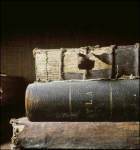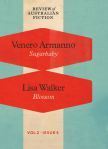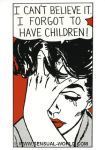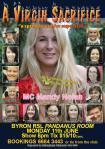Lisa Walker's Blog, page 10
July 30, 2012
Do I really need to ditch the tracksuit?
This year I decided to take a year off my community relations job in order to focus on my writing. Being a full-time writer sounds kind of glamorous. To me it evokes an image of a sultry looking woman in black beret, a cigarette holder hanging out of her mouth as she bangs away at her keyboard in a funky cafe. That woman may be out there, but she isn’t me.
As I write this I am wearing tracksuit pants that seem to have the remains of last night’s dinner on them, I haven’t washed my hair for at least a week, I am drinking Coles brand green tea and I haven’t shaved my legs since, um… Too much information? Sorry.
I suspect that many writers are like me – we sink into total slobdom when not required to make appearances in the world. Which brings me to the Byron Writers Festival. I have attended at least ten years of the festival, and this year for the first time I will be on the other side of the platform looking out. Yay!
I’m looking forward to it, but it also strikes me as being a strange thing – to herd a group of people who are more used to conversing with imaginary friends than real people onto a stage. While writing requires inappropriate thoughts to be shared – it’s called honesty – other forms of communication don’t always call for this. Perhaps this is what makes writers’ festivals good entertainment. Often you are watching someone who is totally unpractised saying whatever comes into their head. It can be refreshing.
So anyway, I’m planning to wash my hair in a couple of days and shake the dust off a nice frock. I think I might have some lipstick stashed away somewhere. And as for what comes out of my mouth? We shall see…
Catch me looking well groomed (or at least clean) at the Byron Writers Festival 1.15 Friday and 10.45 Sunday. 


July 18, 2012
Masculinity, sexuality and tenderness – ‘Darkness on the Edge of Town’ by Jessie Cole
A crashed car on a country road, a fragile young woman and man who collects broken things… These are the elements which introduce Jessie Cole’s debut novel, Darkness on the Edge of Town.
Vincent is something of a drifter, a handyman on the cusp of forty, unpolished, but tender. From the moment he stops to help the young woman he finds sitting beside her crashed car, his life takes a new direction. Rachel, brittle and grieving, returns to Vincent’s house and a strange and intense relationship develops between them.
Vincent’s daughter Gemma is sixteen, and entering the unknown land of male and female relationships. She wonders how she can spend all night talking to a boy and then, ‘at school he acted like he’d never seen me before…’ Gemma has watched Vincent move from woman to woman in the town, always choosing ones with, ‘a half-crazy edge’. ‘I used to wonder what it was about my dad that attracts these women… But lately I’m thinking maybe I should be worried about what it is that he needs from them.’ Gemma watches with apprehension as the dynamic between Vincent and Rachel changes.
The story is told from the alternate voices of father and daughter. Both voices are strong, distinct and totally authentic. There are some beautiful moments between Gemma and her father such as when Vincent tries to tell her how he feels about Rachel. ‘…I can never explain it, and the more I’d try the weirder it’d sound.’ All three characters struggle to communicate their feelings – the gaps between what they say and what they feel ring loudly.
Set in an isolated valley in the Northern Rivers, the novel explores themes of masculinity and sexuality, communication and miscommunication. In the style of writers like Tim Winton, it is a tense and gripping portrayal of the current that lies beneath relationships in the smallest of towns.
The theme of male violence also pervades the book. Vincent, though compassionate and principled, is quick to anger. I read the book with a knot of apprehension which grew as the story progressed. But what touched me most was its quality of transience. As Vincent reflects, lying next to Rachel, ‘I lay there, still and quiet, knowing that nothing lasts forever, but sort of hoping that it could.’
This is a novel you’ll read quickly and then wish you’d read slowly because you don’t want it to end.
This is my tenth review for the Australian Women Writers Challenge .
.
Join Jessie and I in conversation at Lennox Head Library 10.30am on the 24th of July or Lismore Library 5.30pm on the 26th July. Free events. All welcome.
Or, otherwise at the Byron Writers Festival 3-5th August.
Hope to see you there!


July 16, 2012
Oh no – I can’t believe I’ve got nothing to read!
Most keen readers would know the fear of being stuck somewhere with time to kill without a book to read. There is nothing worse than thinking of all the time you are wasting when you could have been reading. This doesn’t happen to me often, but occasionally on holiday I underestimate my reading capacity. I have the kind of holidays that involve carrying backpacks so weight is a major consideration.
Last week, I was out ski touring in Kosciusko National Park. On day two I finished Caleb’s Crossing and anxiety set in. I looked enviously at my son who was gaily reading his way through any number of lengthy fantasy novels on his Kindle. Imagine my delight when we did a day tour to another hut and I found a stash of old novels thoughtfully left behind. Blackeyes by Dennis Potter was the perfect accompaniment to the last couple of days of the trip.
It made me think of the other treasures I have picked up to read on my travels – Murakami’s IQ84 in a backpackers in Tokyo, Peter Matheson’s The Snow Leopard in Kathmandu and Zen and the Art of Motorbike Maintenance in London. Picking up books like this is a special part of travel. In a way it bonds you to that other anonymous other travelling reader you will never meet.
While it might be time to buy a Kindle and load it up with a hundred books, I still think you can’t beat the excitement of waiting to see what fate will deliver.
Have you ever picked up any literary treasures while on the road?
If you are in the Northern Rivers next week, Jessie Cole , author of Darkness on the Edge of Town and myself will be doing talks at Lennox Head library at 10.30am on Tuesday 24th July and Lismore Library on Thursday 26th July at 5.30pm. Free events. All welcome.
, author of Darkness on the Edge of Town and myself will be doing talks at Lennox Head library at 10.30am on Tuesday 24th July and Lismore Library on Thursday 26th July at 5.30pm. Free events. All welcome.


June 27, 2012
Chopsticks, what chopsticks? Why you need to stay on good terms with your editor.
Picking up continuity gaps in movies is great fun – life jackets disappearing and reappearing as the Titanic goes down, swords changing from hand to hand in Lord of the Rings, eyes opening and closing on dead bodies… But what about continuity gaps in novels?
I have just finished the copy edits for my next book, ‘Sex, Lies and Bonsais’ – about five days work. It is as good as I can make it. No doubt when I read it again I will see mistakes I should have fixed, but for now it is the best I can do.
Editing is a very humbling process. In the interests of full and frank disclosure, I can now reveal that, yes, I had completely forgotten that they were eating with chopsticks at the moment when the father started banging his plate with his fork. And yes, I had also forgotten that the main character had thrown her phone into a fishpond in the chapter before she miraculously pulled it out of her pocket again. In my previous book, ‘Liar Bird’ I had somehow managed to forget that Cassie had just chucked a hissy fit about having no television in the chapter before she started happily watching the news on TV.
The trouble with writing is that it doesn’t happen in real time. When it takes over a year to get from beginning to end it is very easy to forget these trivial matters of continuity. In my next book, which my agent is currently reading, I lost a dog for a good ten chapters.
Editing a book always reminds me of that cartoon of a pondering fifties style woman – ‘I can’t believe I forgot to have children.’ Easily done, I would say.
So when you read a book which hangs together, where the main character keeps the same name, she doesn’t lose her dog, she doesn’t magically change car brands and she remembers that she’s a vegetarian – you can be sure that an editor has been there before you.
Have you ever noticed any continuity gaps in novels?








June 23, 2012
Review – Mad Men, Bad Girls and the Guerrilla Knitters Institute By Maggie Groff
Mad Men, Bad Girls etc. Is the debut novel by north coast author, Maggie Groff who has previously written two bestselling works of non-fiction. The novel is a comedy crime caper set between Byron Bay and the Gold Coast.
Freelance journalist Scout Davies works at a desk which ‘overlooks Byron’s main thoroughfare, Jonson Street, where the muse in charge of fabulous things has dropped the biggest fancy-dress party in the world.’ Given a job to investigate a dodgy American cult, The Luminous Renaissance of Illustrious Light, which has moved to the Gold Coast, Scout sets to work.
Scout’s sister Harper (her parents were fans of ‘To Kill a Mockingbird’) also needs her help with an underwear cutter on the loose in her school. This unleashes a second plot strand of cyber-bullying and school politics. Scout goes on the hunt to solve these mysteries, following a number of clues and red herrings. Adding difficulty is the fact that Scout is an insulin-dependent diabetic. Naturally this creates difficulties out in the field.
There is plenty of danger and intrigue as Scout infiltrates the cult, coming face to face with its ‘Mystic Master’ Serene Cloud, a man who, ‘in another place, in another colour (would) have made a fabulous Santa Claus.’ Also fun is Scout’s mission with the Guerrilla Knitters Institute, a group that leaves stealthy graffiti ‘yarn bombs’ around the town and her banter with her cat and side-kick, Chairman Meow. I enjoyed the Byron Bay flavour as Scout picnics at Wategos and chats with locals.
Mad Men, Bad Girls is a witty, fast moving romp. It has plenty of great lines and a very sexy love interest in the form of a local cop, Rafe, who is possibly a little too good to be true, but who cares? Neither Scout nor Rafe seem to struggle too much with the fact that Rafe is a friend of Scout’s long-term boyfriend who is currently on assignment in Afghanistan.
The plot motors along with almost all of the strands satisfactorily resolved by the end. We leave Scout in love with two men and with an ample cast of lively characters to explore in the next book, which I believe is in the pipeline. This is light hearted crime in the mode of Kerry Greenwood. Curl up on the couch and enjoy.
This is my ninth review for the Australian Women Writers Challenge.








June 13, 2012
Writing about sex is hard – but not as hard as stand-up comedy
Monday night was the big night. After six weeks of baby steps we comedy virgins took the stage at the Byron Services Club. It was pretty packed, especially considering that it was raining torrentially. I must admit that for a while there I was hoping a flash flood might cut Byron off, or a tornado rip through the town, or at least a tree bring down a power pole leading to the event being cancelled.
But no, there we were. And there they were. Ready to be entertained.
Learning comedy has been enlightening. A good comedian looks like they’ve just popped in to share their thoughts with you. But in fact, developing a routine is a rigorous process from ideas to writing to rehearsal to learning to performance.
I have learnt about the importance of the premise, the illusion of spontaneity and finding a comic persona which is a reflection of your authentic self. And then, having found your authentic self, you need to lay it all bare to a room full of strangers and hope to hell they have the same sense of humour as you. Because comedy is not a monologue, it is a conversation. It is something that happens between the performer and the audience. It takes two to tango.
Five minutes is not a long time. But it is way long enough for a lot of things to go wrong. As our esteemed leader Mandy Nolan said on the night, ‘Tonight we’re going to find out whose chutes aren’t going to open.’ Five minutes can be an eternity if you’re in free fall.
We started with a group of fifteen, but as we came closer and closer to the day, several of my classmates discovered other pressing commitments. On the big night only ten remained. In the interests of getting it over with quickly, I went up first. And what else would I talk about, but writing.
It was a fun night. What struck me was the diversity of the performances. It seems obvious, but people really are so different! There is something very warming about seeing others share their struggles in a comic way.
I don’t think I’ll be back for more, but I’m pleased that I pushed my boundaries and gave it a go. And, did my parachute open? You can be the judge because here it is…








June 6, 2012
Walking with Ants in Tasmania – Cate Kennedy’s ‘The World Beneath’
I loved Victorian writer, Cate Kennedy’s, short story collection, Dark Roots, so I was keen to read her debut novel. Cate’s short stories exhibit a wry eye for the minutiae of human flaws. This skill is deftly at play in The World Beneath which was published in 2010.
The story is told from three points of view. Rich and Sandy are an estranged mid-forties couple who met on the Franklin River Blockade in 1983. This was the zenith of their lives – nothing has come close since. As Sandy says; ‘What do you do when you’ve experienced that? What do you do for the rest of your life?’ Mid-life meltdown here we come.
Sophie, their daughter, is an angry teenager searching for the father she has never known. Rich roared off in his Kombi when she was a baby. Brought up on tales of the blockade, Sophie is deeply cynical. Her unflinching gaze tarnishes even this hallowed moment.
Wanting to bond with Sophie, Rich induces her to go on a six day walk in Tasmania. On arrival, he is insulted to find the wilderness pre-packaged for a too-large audience. Tension builds as Rich’s desire to impress Sophie with a ‘real’ experience drives him into risky behaviour.
Kennedy gleefully skewers Sandy’s political correctness. She envies the way her friend has her baby’s placenta swaddled to him in fabric from Rajasthan; ‘a very ancient tradition.’ If only she’d thought of that. Rich’s pretensions to ‘hipness’ are also cringe-inducing.
Anyone who has bushwalked will recognise the know-it-all walker. Wondering how many days of rain the park got? Unsure whether to boil the water? Mildly interested in birds? ‘Russell was your man.’ Having bushwalked in The Labyrinth myself and experienced the amazing frenzy of the ants, I also enjoyed these scenes.
Underneath the humour is a question that will resonate with many in Rich and Sandy’s age group; what does it mean to give up your freedom by having children? Whose life has more meaning, Rich’s or Sandy’s? Rich has tripped around the world, but missed its significance. He wonders if, rather than an anchor, Sophie would have been ballast; something to steady him in life.
While there are no answers here for the mid-life crisis, there is plenty of fuel for reflection on relationships, delusion and family ties.
This is my eighth review for the Australian Women Writers Challenge .
.








May 28, 2012
Playing Bingo on New Year’s Eve– my short story ‘Blossom’
My story ‘Blossom’ appears in the Review of Australian Fiction this week, partnered with a story by Venero Armanno, ‘Sugar Baby’.
The Review of Australian Fiction is a new online magazine that aims to support Australian Fiction by publishing stories by established writer s partnered with an emerging writer of their choice.
Veny’s short story ‘Sugar Baby’ is actually more of a novella and explores the emotional cost of an older man seeking comfort via a financial transaction with a much younger woman. For those who don’t yet know Veny’s work, you have a treat in store.
My story, ‘Blossom’ started on a trip to Japan where we spent New Year’s Eve as the only foreigners in a small lodge in the snow. I was very taken with the way the evening was organised. A whiteboard was set up in the lounge room outlining the agenda. Events ran to the minute and included bingo, noodles, a visit to the train station to see the snow train go by and a prayer at the Shinto shrine. The last item on the agenda, taking place just after midnight, was ‘sleep’. It was such a contrast to the way we celebrate New Year’s Eve here.
In ‘Blossom’ I transported this New Year’s Eve to a train station in Byron Bay where an Australian woman meets a Japanese girl. I wanted to explore the idea that a chance meeting with a stranger can change your life. Especially in Byron Bay of course…
The Review of Australian Fiction  operates by passing royalties on to the authors of the stories so you can subscribe, happy in the knowledge that you are feeding a chocolate-hungry author. It is a bargain at $2.99 an issue and comes out fortnightly.
operates by passing royalties on to the authors of the stories so you can subscribe, happy in the knowledge that you are feeding a chocolate-hungry author. It is a bargain at $2.99 an issue and comes out fortnightly.








May 24, 2012
Laughing about Climate Change – ‘Solar’ by Ian McEwan
 A new Ian McEwan novel is always an event, although I must confess that this one is not very new – it was published in 2010. The world (well, me anyway) has been waiting for a long time for the great climate change novel and if anyone can do it, McEwan can.
A new Ian McEwan novel is always an event, although I must confess that this one is not very new – it was published in 2010. The world (well, me anyway) has been waiting for a long time for the great climate change novel and if anyone can do it, McEwan can.
Ian McEwan is known for his grasp of science and novels that interweave rational argument and emotion. Enduring Love features a science writer, Saturday a neurosurgeon and now, with Solar, we meet Michael Beard, a Nobel prize-winning physicist. So how does McEwan tackle this most complex and rather boring subject? Dystopian futures and eco-thrillers have been the main weapons of choice for climate change novelists, but McEwan does something different – he makes us laugh.
Michael Beard is a fat, randy has-been who has done nothing significant since his prize winning Beard-Einstein Conflation many years ago. Offered a place on an artist’s trip to the Arctic to examine the effects of climate change, Beard jumps on a jet to Norway (carbon off-set of course). Soon he is getting his delicate parts caught in a zip while urinating at minus forty degrees and fleeing a hungry polar bear on his skidoo.
Getting on board the solar bandwagon, Beard reassures his business partner; ‘Here’s the good news. The UN estimates that already a third of a million people a year are dying from climate change. Bangladesh is going down because the oceans are warming and expanding and rising. There’s drought in the Amazonian rainforest. Methane is pouring out of the Siberian permafrost… Now the eastern Antarctic is going.’
Yes, this is black comedy at its best. The boot room on the frozen-in boat where the artists are staying becomes a metaphor for the planet as it descends day by day into further chaos. ‘How were they to save the earth,’ Beard wonders, ‘when it was so much larger than the boot room?’ There is also a laugh out loud moment when Beard helps himself to a stranger’s chips. This in turn becomes a metaphor for our need to re-examine known facts in light of new evidence.
While Solar might not be the hallelujah moment in fiction that climate change activists would hope for, it has does carry an important message – a flawed scientist does not mean that the science is wrong.
You can also just read it for laughs.
For people in the Ballina area, I’ll be talking about my writing at Ballina Library at 10am on the 4th of June. Do pop along if you can!








May 8, 2012
Lusting after the TV weather man – ‘Yearn’ by Tobsha Learner
 I loved the cover of Yearn so much I just had to pick it up. The voluptuous, tattooed woman floating with a crimson parasol had the allure of the off-beat. She promised a lot, but could she deliver?
I loved the cover of Yearn so much I just had to pick it up. The voluptuous, tattooed woman floating with a crimson parasol had the allure of the off-beat. She promised a lot, but could she deliver?
Erotic fiction is difficult. Badly written, it is smutty, embarrassing or just plain boring. Too much sex and it becomes the opposite of erotic. I am reminded of the over-achieving couple who doggedly set out to have sex every day for a year. Ho hum, I bet the champagne corks were popping at the end of that year. Anais Nin, anyone? Let’s face it, if you can do this genre well you’d be mad not to build a career around it. Tobsha Learner, a part-time Australian, is the bestselling author of four novels and two previous collections of short stories, Quiver and Tremble. She’s good with titles too.
Not only erotic, many of the stories in Yearn play with magic and fantasy. Ink is the story of a young biographer using ancient sex magic to get revenge on an older and more famous rival. In Fur, a girl is transformed by the visits of a fantasy lover with some connection to her cat. In The Alchemy of Coincidence a sculptor conjures up her dream lover while preparing for her new collection.
Other stories are more romantic. In Barrow Boy a self-made man has an epiphany after reuniting briefly with his childhood sweetheart. Pussy and Mouse is a surprisingly moving account of a lonely call centre worker finding love online and in Flower, an older woman learns to appreciate her body’s beauty. There is sensuality as well as sexuality; ‘The woman didn’t walk so much as flow… an assemblage of fluid molecules seamlessly gliding through space.’
I enjoyed the way Learner plays with sensuality – fur, porcelain, weather… Who hasn’t been stirred by a warm breeze or a sudden storm? In Weather, a woman fantasises about the TV weatherman. ‘Fog was interesting – a short push with both hands… suggesting that … he might be capable of a little rough play…’ There is also humour; ‘…don’t forget the patches of fog in the north-east… oh yes, oh yes, sweeping rain, and yes! The breaks of sunshine!’ Weather has never been so sizzling.
Learner’s writing is good enough to avoid the perils of purple prose. Plenty of variety, no ho hum. Read this one in private.
This is my seventh review for the Australian Women Writers Challenge.














